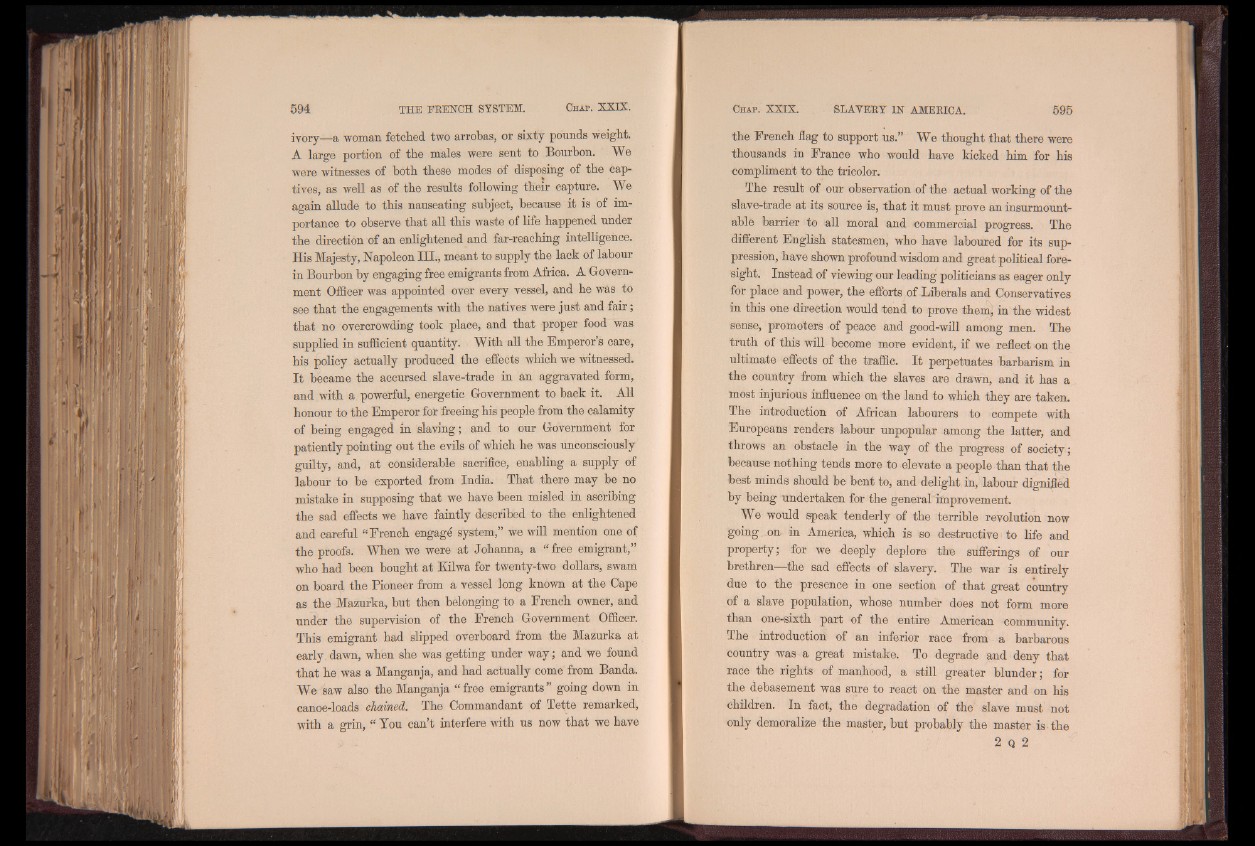
ivory—a woman fetched two arrobas, or sixty pounds weight.
A large portion of the males were sent to Bourbon. We
were witnesses of both these modes of disposing of the captives,
as well as of the results following their capture. We
again allude to this nauseating subject, because it is of importance
to observe that all this waste of life happened under
the direction of an enlightened and far-reaching intelligence.
His Majesty, Napoleon III., meant to supply the lack of labour
in Bourbon by engaging free emigrants from Africa. A Government
Officer was appointed over every vessel, and he was to
see that the engagements with the natives were just and fair ;
that no overcrowding took place, and that proper food was
supplied in sufficient quantity. With all the Emperor’s care,
his policy actually produced the effects which we witnessed.
I t became the accursed slave-trade in an aggravated form,
and with a powerful, energetic Government to back it. All
honour to the Emperor for freeing his people from the calamity
of being engaged in slaving ; and to our Government for
patiently pointing out the evils of which he was unconsciously
guilty, and, at considerable sacrifice, enabling a supply of
labour to be exported from India. That there may be no
mistake in supposing that we have been misled in ascribing
the sad effects we have faintly described to the enlightened
and careful “French engage system,” we will mention one of
the proofs. When we were at Johanna, a “ free emigrant,”
who had been bought at Kilwa for twenty-two dollars, swam
on board the Pioneer from a vessel long known at the Cape
as the Mazurka, but then belonging to a French owner, and
under the supervision of the French Government Officer.
This emigrant had slipped overboard from the Mazurka at
early dawn, when she was getting under way; and we found
that he was a Manganja, and had actually come from Banda.
We "saw also the Manganja “ free emigrants” going down in
canoe-loads chained. The Commandant of Tette remarked,
with a grin, “ You can’t interfere with us now that we have
the French flag to support us.” We thought that there were
thousands in France who would have kicked him for his
compliment to the tricolor.
The result of our observation of the actual working of the
slave-trade at its source is, that it must prove an insurmountable
barrier to all moral and commercial progress. The
different English statesmen, who have laboured for its suppression,
have shown profound wisdom and great political foresight.
Instead of viewing our leading politicians as eager only
for place and power, the efforts of Liberals and Conservatives
in this one direction would tend to prove them, in the widest
sense, promoters of peace and good-will among men. The
truth of this will become more evident, if we reflect on the
ultimate effects of the traffic. I t perpetuates barbarism in
the country from which the slaves are drawn, and it has a
most injurious influence on the land to which they are taken.
The introduction of African labourers to compete with
Europeans renders labour unpopular among the latter, and
throws an obstacle in the way of the progress of society;
because nothing tends more to elevate a people th a n that the
best nunds should be bent to, and delight in, labour dignified
by being undertaken for the general improvement.
We would speak tenderly of the terrible revolution now
going on in America, which is so destructive to life and
property; for we deeply deplore the sufferings of our
brethren—the sad effects of slavery. The war is entirely
due to the presence in one section of that great country
of a slave population, whose number does not form more
than one-sixth part of the entire American community.
The introduction of an inferior race from a barbarous
country was a great mistake. To degrade and deny that
race the rights of manhood, a still greater blunder; for
the debasement was sure to react on the master and on his
children. In fact, the degradation of the slave must not
only demoralize the master, but probably the master is the
2 q 2